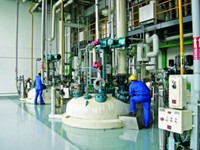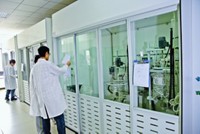Advertisement
Grab your lab coat. Let's get started
Welcome!
Welcome!
Create an account below to get 6 C&EN articles per month, receive newsletters and more - all free.
It seems this is your first time logging in online. Please enter the following information to continue.
As an ACS member you automatically get access to this site. All we need is few more details to create your reading experience.
Not you? Sign in with a different account.
Not you? Sign in with a different account.
ERROR 1
ERROR 1
ERROR 2
ERROR 2
ERROR 2
ERROR 2
ERROR 2
Password and Confirm password must match.
If you have an ACS member number, please enter it here so we can link this account to your membership. (optional)
ERROR 2
ACS values your privacy. By submitting your information, you are gaining access to C&EN and subscribing to our weekly newsletter. We use the information you provide to make your reading experience better, and we will never sell your data to third party members.
Business
In Their Backyard
Leading Chinese producers of pharmaceutical ingredients see opportunities in home market
by Jean-François Tremblay
July 6, 2009
| A version of this story appeared in
Volume 87, Issue 27

For Chinese producers of pharmaceutical ingredients, selling abroad has traditionally been the key to high profits. Among the most profitable producers of drug ingredients in China are several firms that export virtually all of their output to Europe, North America, and Japan.
For the past few months, however, many of these export-focused companies have been seeing more opportunity in their home market than overseas. Whereas demand in developed countries has weakened since the global economic crisis got under way, China's health care market is still growing rapidly. Chinese demand is particularly strong for the high-quality drug ingredients that, in the past, companies mostly exported.
"We've spent several years establishing ourselves internationally, building our credentials with foreign customers, and operating our facilities in ways that meet foreign regulatory standards," said Xinliang Xu, president of Apeloa Kangyu, a Zhejiang-based producer of active pharmaceutical ingredients (APIs). "Now, we're looking at positioning ourselves in China." Xu and other Chinese drug ingredient executives spoke to C&EN at the pharmaceutical ingredients trade show CPhI China in Shanghai late last month.
At Shanghai Pharmaceutical Import & Export, the trading arm of Shanghai Pharmaceutical, Vice President Sean Li sees the international market as a lot less attractive than it used to be. "From my point of view as a trader, the international market for APIs and formulated pharmaceuticals is shrinking," he said. "We're going to compensate by boosting our business of importing pharmaceuticals into China."
Fuqiang Sun, president of Changzhou Watson Fine Chemical, a custom producer of pharmaceutical intermediates, said he is experiencing modestly lower international sales this year. "I'm a little bit concerned, frankly, but I do expect sales to resume their growth next year," he said. According to Sun, sales fell because his customers, almost exclusively located abroad, are purchasing smaller quantities, are more aggressive in demanding discounts, and are more cautious before launching new projects. Like others, Sun said he is paying closer attention than before to China.
The focus on home is accompanied by a heightened emphasis on R&D, according to David Mei, product development manager at Jiuzhou Pharmaceutical, an API producer in Taizhou, Zhejiang province. In the past, he said, Chinese firms relied on universities and research institutes to do their product development for them, but this is no longer viable. "There's a problem with the safety of intellectual property when dealing with these organizations, and moreover, they don't understand business," he said.
Like others, Jiuzhou is paying more attention to its sales in China than ever before. Jiuzhou depends on foreign buyers for well over 80% of its sales. But Mei said the firm has set up a new department to explore opportunities in China.
Taiwan-based ScinoPharm is building new API and intermediates facilities in Changshu, located two hours by car from Shanghai, to complement its operations at home. The company will close an R&D facility and intermediates plant in Kunshan, China, and relocate the staff to Changshu, which is nearby. Costs are lower there than in Taiwan, the firm says, and it expects that a significant portion of the drug ingredients made in China will also be sold there.
Until recently, ScinoPharm would not have been competitive in China because of the money it spends on quality control and on adhering to high environmental, health, and safety standards, President Jo Shen said. But the Chinese government's crackdown on unsafe and polluting firms is leveling the playing field.
In addition, ScinoPharm executives point to a number of multinational drug companies that are expanding their sales in China and looking for world-class ingredient makers in China to supply their facilities there. "To a certain extent, we're following our customers into China with this new plant," said Hardy W. Chan, ScinoPharm's chief scientific officer.
Shen sees opportunities to supply both the generic and innovative drug markets in China. For drug innovators, she said, ScinoPharm offers expertise in process development and commercial manufacturing that complements the capabilities of the numerous contract research firms now operating in China.
On the generics side of the business, major companies are becoming active in China as part of their diversification away from innovative blockbuster drugs, Shen said. As incomes rise in China, Chinese patients are becoming more likely to pay for the peace of mind that comes from buying a drug, even a generic, that carries the brand of a major international firm.






Join the conversation
Contact the reporter
Submit a Letter to the Editor for publication
Engage with us on Twitter